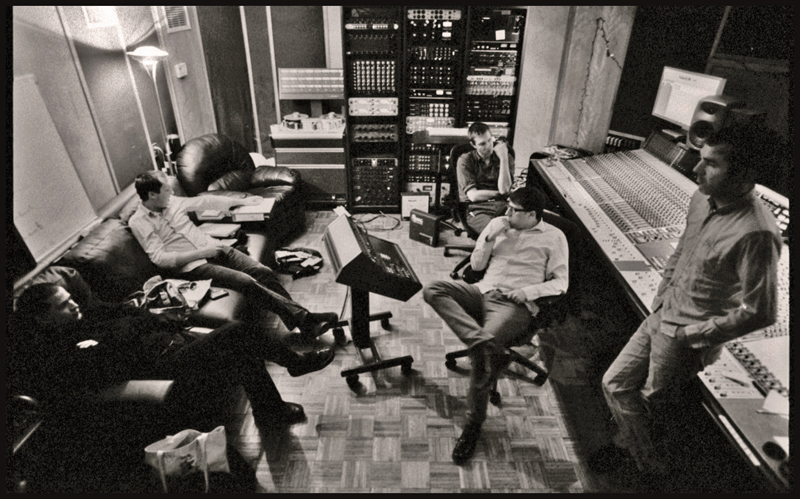
![]()
Nobody makes a record quite like Sigur Rós. Many have tried, and all have failed. This niche they have carved out for themselves puts them in a rather unique position; one where expectations are almost simply that they just make music that sounds beautiful. The consumate professionals they are though, the band hasn’t simply rested on their laurels and made the same record five times over. They’ve spent the last 15 years refining and twisting their post-rock crescendos in new and exciting ways that may not always have worked but still kept fans engaged. They earned so much credit for the brilliance of Ágaetis Byrjun that nobody even blinked an eye when they invented their own language. The point was to show how the voice is but another instrument, and you don’t need words to express your feelings if the melody already does that for you. They furthered that point by titling their 2002 record (), with a track listing that was (for all practical purposes) “Untitled #1” through “Untitled #8”. They followed that record up with Takk, an album that pushed at the edges of restraint and took on a sunnier, more explosive disposition. Yet that still didn’t quite prepare you for 2008’s Með suð í eyrum við spilum endalaust, which featured the band trying to trim the bloat of some of their grandest and most atmospheric work in an effort to fully harness those moments of pure release. The shift was both a blessing and a curse. Great as it was to hear Sigur Rós breaking out of their mold a little bit, they didn’t fully commit to the idea and the album wound up uneven as a result.
After more than a decade of the recording and touring cycle, Sigur Rós decided to take a bit of a hiatus in 2009 to spend time with family or work on other projects. Frontman Jónsi Birgisson first made an atmospheric instrumental record with his boyfriend Alex Somers called Riceboy Sleeps, then took on a legitimate solo album that was heavy on pop and light on atmosphere. The band tried to keep up with their schedule of releasing an album every 2-3 years by unleashing Inni last year, a double disc live album and DVD recorded at a couple shows the band played in London in 2008. That served as a great reminder of how the band’s catalogue has evolved over the years, though it didn’t do much to hint at where they might head next. In an interview in the Wall Street Journal late last year, band members described their new album Valtari as “introverted,” “floaty and minimal,” “ambient” and “a slow takeoff toward something.” All too often what the music makers hear versus what the music listeners hear tends to be two different things, but in this rare case the record comes as described. That can be a positive or a negative depending on how you look at it.
If you were thrilled by how Með suð í eyrum við spilum endalaust changed the game for Sigur Rós by taking them in a poppier, freak-folkish direction, Valtari will instantly feel like a betrayal of that and a step backwards. Fans of the band’s earlier material that was largely atmospheric and measured should find solace that the new album is ingrained with that same spirit. Yet it’s still missing one essential component. For years, the best word to describe Sigur Rós was “epic.” Jónsi would play his guitar with a violin bow, and the noise would be so expansive it could topple mountains and carve out canyons. The visual representations of the music are intended to be equally impactful. In their video for “Glósóli” kids jump off an oceanside cliff, and their video for “Untitled #1” has schoolkids playing outside in a post-apocalyptic wasteland while wearing gas masks and building snowmen out of ash. As a mode of contrast, the video for Valtari‘s first single “Ekki Múkk” is nearly eight minutes of grainy footage showing a boat floating through the air over the ocean. That does not lend itself well to the word “epic”, and neither does the song. So while this record might be long on mood and time, it comes up short on big moments. That doesn’t make it bad, just once again different from everything else they’ve done.
The classic Sigur Rós move is to steadily build tension within a track and then give release in an outpouring of noise. That’s the standard for post-rock in general, actually. The closest thing you’ll get to that on Valtari is “Varúð”, which develops into an ocean of loud right around the 4.5 minute mark. A track like “Rembihnútur” however, becomes loud out of sheer necessity given the number of instruments and moving parts attempting to fit into that space. Graceful orchestral swells primarily take the place of widescreen guitars, and percussion seems to be a second thought or entirely forgotten on many of the songs. Similar things could be said about Jónsi, whose vocal presence vanishes entirely from the last third of the record. As one of the band’s most unique and greatest assets, his absence is felt the most, even if he’s pounding the keys on stark piano-driven pieces like “Varðeldur” and “Fjögur Píanó” instead of singing. But such twists are part of what make Sigur Rós such a compelling band to listen to time and time again. Just when you think they’re headed into autopilot, they hang a left and take a new road.
With the consistent sonic maneuvering between records, one of these days Sigur Rós is going to turn down the wrong path. Valtari could well be start of the band’s slow decline from their mountaintop. The record’s biggest strength and weakness is its complacency. Six albums in, so many of us want more with each new release, and this album is one case where the band is giving us less. The soundtrack to the most immense and incredible natrual wonders of the world has been replaced by the experience of sitting by a lake in the woods at sunset. The way the light shimmers off the calm water is breathtakingly gorgeous, but plenty of people will shrug their shoulders and ask where the beaches and waves are. For an oft minimalist record such as this, sometimes you need to just sit back and appreciate how little it takes to craft something that’s meaningful and emotionally stirring. Sit in the dark and let the music steamroll over you, giving it your full and undivided attention for an hour. If you can’t detect the care, precision and love poured into it, perhaps this isn’t the record for you. This is one for the socially awkward, the mentally calm and the extremely artistic. It stands to be their most divisive long player to date. Whether you love it or hate it or simply feel indifferent about it, you still can’t deny this album is anything less than beautiful. From that point it’s just a matter of if that beauty goes beyond skin deep.














